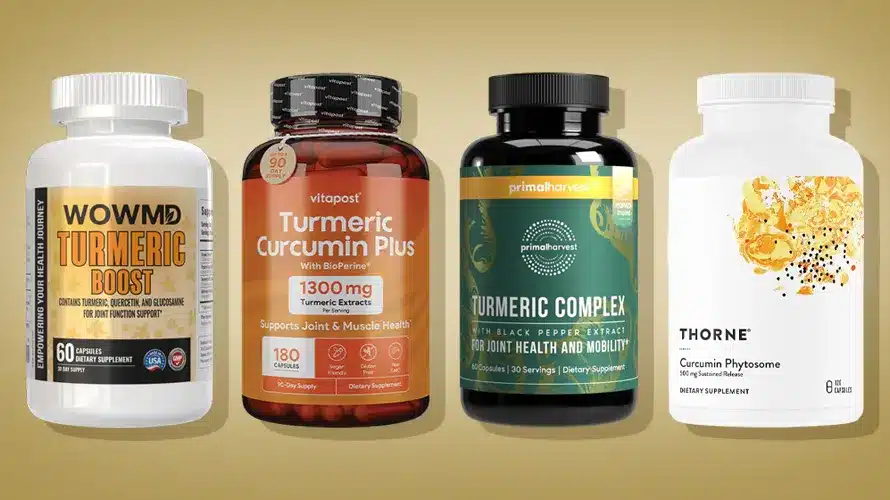
Highlights
- Turmeric’s curcumin compound is known for powerful anti-inflammatory and antioxidant benefits.
- Many high-quality products use BioPerine® or other absorption enhancers to improve bioavailability.
- Turmeric may support joint comfort, immune function, and digestive wellness.
- Explore our top turmeric supplement picks to choose the right formula for your needs.
Overview
Turmeric, a vibrant yellow spice, has been valued in both cooking and Ayurvedic medicine for its potential healing properties. Its key compound, curcumin, is known for its health benefits, offering anti-inflammatory and antioxidant effects.
If you’re considering turmeric supplements for these advantages, the market offers a wide selection. However, choosing the right one can be tricky due to the abundance of options. Dr. Krit Pongpirul, an Associate Professor of Preventive and Social Medicine at Chulalongkorn University in Bangkok, states that turmeric is often consumed in its spice or supplement form to quell gastrointestinal symptoms like bloating and indigestion
To ease your decision-making, a team of nutrition experts has identified the best turmeric supplements. They consider factors such as product cost, the number of expert endorsements, and third-party certification for quality and safety. This guidance ensures you can confidently select a high-quality turmeric supplement.
What Is Turmeric?
Turmeric is a yellow-colored spice that comes from the underground stem of the turmeric plant. This plant grows naturally in parts of Southeast Asia. For thousands of years in traditional Indian and Eastern Asian medicine, turmeric has been used to treat different health problems. Some of the problems include skin issues, joint pain, digestive problems, and respiratory illnesses affecting the nose, mouth, throat, and voice box.
There are several ways to consume turmeric. It can be used as a powdered spice added to food. Turmeric is also available as supplement pills or capsules. The whole turmeric root can be used in cooking. Turmeric tea is another option. Applying turmeric paste directly on the skin is also possible.
The main active compound in turmeric that gives it its yellow color is called curcumin. However, turmeric also contains other similar substances known as curcuminoids. Curcumin is thought to be responsible for many potential health benefits of turmeric.
Supplement labels will say if they contain only turmeric or just curcumin. But it’s hard to say for sure if the turmeric or just the curcumin is responsible for the health benefits seen in scientific research.
Our Top Picks of 2025
Best Overall Turmeric Supplement: WOWMD Turmeric Boost
Best Turmeric Curcumin Supplement: VitaPost Turmeric Curcumin Plus
Best For Joint Health and Mobility: Primal Harvest Turmeric Complex
Best Turmeric Supplement With Meriva:Thorne Curcumin Phytosome
Best Turmeric Supplement For Inflammation: Source Naturals Turmeric
Best Turmeric Gummies: Garden of Life mykind Organics
Best Herbal Supplement Brand: Nature Made Turmeric Curcumin
Best Turmeric Supplement With Bioperine: BioSchwartz Turmeric Curcumin
How We Chose The Best Turmeric Supplements
We evaluated many different turmeric supplements and our recommendations were based on certain criteria:
Third-party testing: We looked for brands that have their products tested by independent labs like USP and NSF. This ensures the label is accurate and checks for things like heavy metals, pesticides, and other contaminants. We also considered companies with strong internal quality control standards.[1] [2]
Forms of turmeric: We researched different forms that could help different issues and budgets. This included capsules, tablets, and gummies. We also looked at turmeric targeted for specific purposes like inflammation, joint support, and immunity.
Ingredient Quality: We favored supplements using higher quality ingredients without artificial preservatives, flavors, sweeteners, dyes, or fillers. Our focus was on all-natural formulas free from unnecessary additives.
We carefully examined marketing claims, ingredient lists, product quality testing, and dosage options to determine the best turmeric supplements based on these standards.
The Best Turmeric Curcumin Supplements of 2025
Here are top Turmeric Curcumin Supplements of 2025 that are available in the market, based on the factors mentioned above.
WOWMD Turmeric Boost – Best Overall Turmeric Supplement
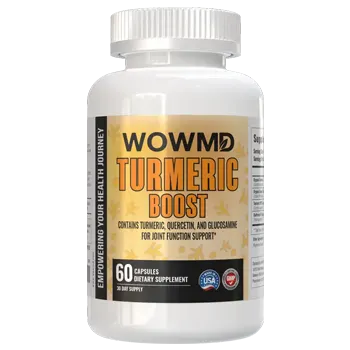 Buy On Official Website
Buy On Official Website*All the prices listed here are as they appear on their websites and are subject to change.
Our Rating
- Comfort 5/5
- Effectiveness 5/5
- Value 5/5
- Convenience 4.9/5
WOWMD Turmeric Boost is a supplement designed to enhance cognitive function, improve memory retention, and promote mental clarity. Combining potent nootropic ingredients, this formula supports overall brain health and helps reduce mental fatigue, making it an ideal choice for those seeking to boost focus and cognitive performance.It also helps in reducing the joint pain and enhances joint mobility.
Key Specs
- Form: Veggie Capsule
- Type: Supplement
- Benefit: Reduces inflammation, supports digestion and immune function, boosts vitality, reduces the joint pain
- Brand: WOWMD
- Active Ingredients: Organic Turmeric Root, Organic Ginger Extract
- Dosage: 1 veggie capsule daily with a meal
- Price: $57.60*
WOWMD Turmeric Boost Pros & Cons
Pros
- Anti-inflammatory properties
- Promotes digestive health
- Vegan-friendly, gluten-free
- 60-day money back guarantee on first single bottle purchase
Cons
- Consistent daily use is essential to see the best results
- High demand may cause limited availability at times
WOWMD Turmeric Boost Customer Reviews
Help me for Joint & digestive Health
These turmeric capsules are great for my joints and digestion. I like that they use high-quality, organic ingredients. – William S.
Simple and Effective
No frills, just results. Love how simple it is to add this to my daily vitamins. It improves my brain health and helps to reduce mental fatigue – Emily S.
WOWMD Turmeric Boost Review | My Key to Better Digestion and Joint Health | Video Credit: WOWMD YouTube Channel
VitaPost Turmeric Curcumin Plus – Best Turmeric Curcumin Supplement
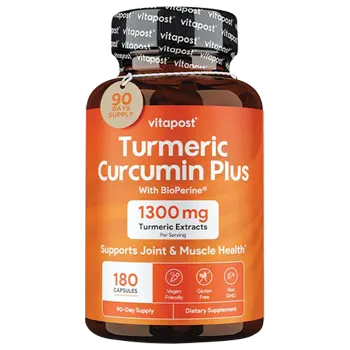
Our Rating
- Comfort 3.9/5
- Effectiveness 3.8/5
- Convenience 3.9/5
- Value 3.9/5
VitaPost Turmeric Curcumin Plus is a high-quality supplement made by Vita Balance, Inc. It contains curcumin, a key ingredient known for aiding joint and muscle health, acting as a powerful antioxidant, and boosting the immune system. Its main benefits include reducing inflammation and protecting cells, including those in the brain.
Key Specs
- Form: Capsules
- Type: Supplement
- Benefit: Helps support a healthy immune system, enhances muscle and joint health, promotes healthy cognitive functioning
- Brand: VitaPost
- Active Ingredients: Turmeric, Curcuminoids, BioPerine®
- Dosage: 2 capsules a day
- Price: $26.95*
- Where to Buy: Amazon
VitaPost Turmeric Curcumin Plus Pros & Cons
Pros
- Supports a healthy inflammatory response
- Supports joint and muscle health
- Improves mental cognition
- Supports healthy weight loss
Cons
Essential Elements T-Hero
- It may cause nausea and dizziness
- May cause alegric reaction to people with certain condition
VitaPost Turmeric Curcumin Plus Customer Reviews
Joint Relief
My joints were very painful and after careful research, I found this product. While only 3 months in, I have noticed a considerable difference. I would not hesitate to recommend.- Kelly
Knee pain is gone
I had a knee injury a few years ago that never really healed. The pain was there all the time. I read online that turmeric could help. I’ve been taking Turmeric Plus for over a month and the pain is almost gone. This supplement is very good and I feel my knee will be 100% again. – George Stephen
Primal Harvest Turmeric Complex – Best For Joint Health and Mobility
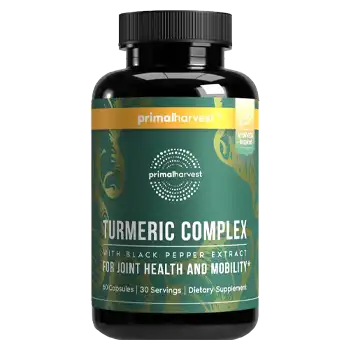
Our Rating
- Comfort 3.9/5
- Effectiveness 4/5
- Convenience 3.9/5
- Value 3.8/5
Primal Harvest Turmeric Complex is a dietary supplement that may provides a number of health benefits like treating joint pain and inflammation, promoting brain and heart health, and improving digestive functioning. It’s a healthy product that can support a healthy immune system, and it’s offered at a reasonable price.
Key Specs
- Form: Capsules
- Type: Supplement
- Benefit: Helps maintain inflammation responses, promotes heart health, supports cognitive functioning and long-term brain health & memory
- Brand: Primal Harvest
- Active Ingredients: Turmeric extract, turmeric root powder, bioPerine
- Dosage: 2 capsules daily
- Price: $38.95*
- Where to Buy: Amazon
Primal Harvest Turmeric Complex Pros & Cons
Pros
- Primal Harvest Turmeric Complex can decrease joint pain and swelling
- This supplement may promote a healthy digestive system
- Primal Harvest Turmeric Complex can support heart health
- The product enhances the health of the brain
- Primal Harvest Turmeric Complex strengthens the immune system
Cons
- High demand sometimes leads to low stock
- Added ingredients would make it more potent
- The effectiveness may vary from person to person
Primal Harvest Turmeric Complex Customer Reviews
No visible results
I used a different product before primal harvest and for me I found the other product worked much better. Primal harvest worked but the other product worked better. – Richard Funaro
Gradual Improvement
I was having difficulty climbing stairs and after taking turmeric for about a week it became less difficult. Still taking it and keeping my fingers crossed. – Murray
Thorne Curcumin Phytosome – Best Turmeric Supplement With Meriva
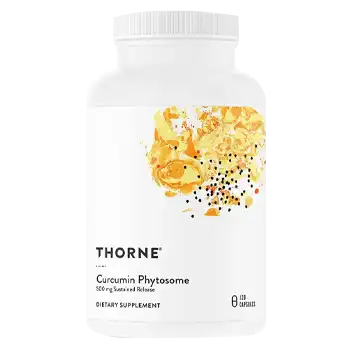
Our Rating
- Comfort 3.9/5
- Effectiveness 4/5
- Convenience 3.9/5
- Value 3.8/5
Thorne Curcumin Phytosome is a dietary supplement containing a specialized form of curcumin, known for its anti-inflammatory and antioxidant properties. It uses a patented phytosome technology to enhance absorption and bioavailability. It may support joint health, promote a healthy inflammatory response, and provide antioxidant support.
Key Specs
- Form: Capsules
- Type: Supplement
- Benefit: May help reduce inflammation in the body and alleviate symptoms, Support joint health, Support cognitive function and brain health and Supporting normal cholesterol levels.
- Brand: Thorne
- Active Ingredients: Curcumin Phytosome
- Dosage: 1-2 capsules two times daily
- Price: $32.00*
- Where to Buy: Amazon
Thorne Curcumin Phytosome Pros & Cons
Pros
- Highly absorbable & bioavailable
- Enhance bone health & May help to reduce joint pain
Cons
- Expensive
- Individual response may vary
- Potential side effects
Thorne Curcumin Phytosome Customer Reviews
Hope it works for bones and joints
Just started taking this. Not sure yet. But hopeful it’s helping my joints and bones. – Sandra C.
Mixed Results with Thorne Curcumin
There may be other benefits besides a balanced inflammatory response, but this is why I was directed to curcumin by my doctor. But I have been taking this twice daily for over a week and feel no decrease in pain or inflammation of my knee problem. – Marymac C.
Source Naturals Turmeric – Best Turmeric Supplement For Inflammation
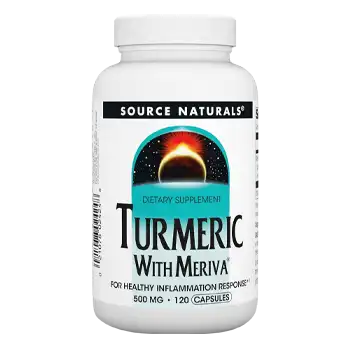
Our Rating
- Comfort 3.9/5
- Effectiveness 4/5
- Convenience 3.9/5
- Value 3.8/5
Source Naturals Turmeric with Meriva is a dietary supplement that contains curcumin from turmeric. Curcumin is known for its potential to support a healthy inflammatory response in the body. This supplement uses a specialized extract combined with phosphatidylcholine to improve the absorption of curcumin, making it potentially more effective than regular turmeric extracts.
Key Specs
- Form: Capsules
- Type: Supplement
- Benefit: Support joint health and comfort, May help maintain a healthy digestive system, overall well-being and vitality
- Brand: Source Naturals
- Active Ingredients: Meriva® Turmeric Complex
- Dosage: 1 capsule 1 to 2 times daily
- Price: $18.90*
- Where to Buy: Amazon
Source Naturals Turmeric Pros & Cons
Pros
- Enhanced bioavailability
- Antioxidant properties
- Natural and safe
Cons
- Response may vary among individuals
- May interact with certain medications
Source Naturals Turmeric Customer Reviews
Supports Wellness, Gentle Formula
I’ve been taking this turmeric supplement for general wellness and joint health. It’s easy to incorporate into my routine, and I like that it uses Meriva for better absorption. While I haven’t experienced any drastic improvements in my inflammation or pain, it seems gentle on my stomach compared to other supplements I’ve tried. I’ll continue using it and see how it goes. – Linda Peterson
Mild Results
I started using Source Naturals Turmeric with Meriva about two weeks ago to support joint health and overall well-being. The formula uses a specialized extract, which I hoped would improve absorption compared to standard turmeric. After using it consistently, I haven’t noticed significant changes in my joint comfort or digestive health. However, I appreciate that it’s an easy-to-take supplement and I haven’t experienced any side effects. At this point, I’m still waiting to see more noticeable results – Mark Anderson
Garden of Life mykind Organics – Best Turmeric Gummies
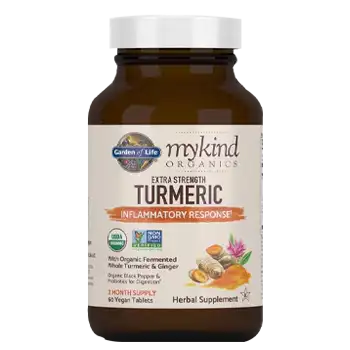
Our Rating
- Comfort 3.9/5
- Effectiveness 4/5
- Convenience 3.9/5
- Value 3.8/5
Garden of Life’s Organic Extra Strength Turmeric combines 100mg of curcumin with fermented turmeric and ginger root for better inflammation support and antioxidant benefits. The formula adds probiotics and black pepper extract to boost absorption and digestion.
Key Specs
- Form: Capsules
- Type: Supplement
- Benefit: Reduce inflammation, Boost immune system and Improve digestion
- Brand: Garden of Life
- Active Ingredients: Organic Turmeric Blend
- Dosage: 1 gummy
- Price: $32.99*
- Where to Buy: Amazon
Garden of Life mykind Organics Pros & Cons
Pros
- Made with organic ingredients
- It is non-GMO, gluten-free, vegan, and kosher
- For people who prefer not to swallow pills
Cons
- Not affordable for all users
- Contains probiotics, which are not suitable for everyone
Garden of Life mykind Organics Customer Reviews
So far good
I’ve only been using once a day for two weeks and the inflammation is not as bad as it was originally. Will continue to use with hope the inflammation continues to improve. – Dolores T.
Not sure if it’s doing anything
Can’t tell if this is doing anything but it isn’t upsetting my stomach so I will keep taking it but not sure I’d order it again or recommend it. – Tera N.
Nature Made Turmeric Curcumin – Best Herbal Supplement Brand
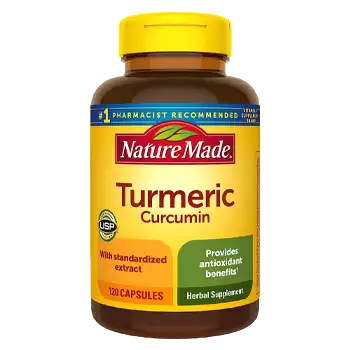
Our Rating
- Comfort 3.9/5
- Effectiveness 4/5
- Convenience 3.9/5
- Value 3.8/5
Nature Made Turmeric Curcumin is a popular herbal supplement that provides antioxidant benefits. It is made from the roots of the Curcuma longa plant, which is an ancient Indian spice. Turmeric contains curcumin, which is responsible for its vibrant yellow color and antioxidant activity.
Key Specs
- Form: Capsule
- Type: Supplement
- Benefit: Provide antioxidant benefits
- Brand: Nature Made
- Active Ingredients: Turmeric Blend
- Dosage: 1 Capsule
- Price: $13.99*
- Where to Buy: Amazon
Nature Made Turmeric Curcumin Pros & Cons
Pros
- Is the #1 pharmacist recommended herbal supplement brand
- Provides antioxidant activity that helps neutralize free radicals in the body
Cons
- Individual response may vary
- Consult your physician if you are taking any blood thinning medications
Nature Made Turmeric Curcumin Customer Reviews
Good supplement lacks taste
I’ve been taking Nature Made Turmeric Curcumin 500 mg for a while and appreciate its health benefits. It’s easy to swallow and has definitely helped with my joint discomfort. However, I was hoping it might have a more pleasant taste or aftertaste, but it’s pretty bland. That said, it’s still a solid supplement if you’re looking for a convenient way to get your daily dose of turmeric without worrying too much about the flavor. – Caly Guy
No Piperine
Really disappointed that they are not putting piperine in their turmeric supplements… that increases the effectiveness of turmeric substantially. – Alexandria W.
BioSchwartz Turmeric Curcumin – Best Turmeric Supplement With Bioperine
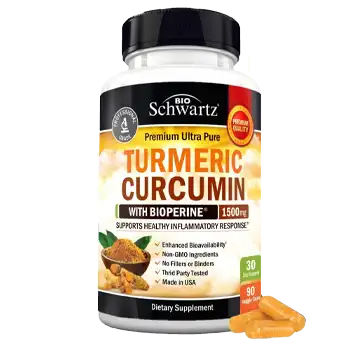
Our Rating
- Comfort 3.9/5
- Effectiveness 4/5
- Convenience 3.9/5
- Value 3.8/5
BioSchwartz Turmeric Curcumin Capsules are a dietary supplement that contains turmeric extract standardized to 95% curcuminoids, the most potent compounds in turmeric root with powerful antioxidant properties. These capsules also include BioPerine® and black pepper extract, which may enhance the absorption of curcumin.
Key Specs
- Form: Capsule
- Type: Supplement
- Benefit: Supports Joint Health, Enhance Bioavailability
- Brand: BioSchwartz
- Active Ingredients: Turmeric extract
- Dosage: 3 Capsule, 1 or 2 times per day
- Price: $24.99*
- Where to Buy: Amazon
BioSchwartz Turmeric Curcumin Pros & Cons
Pros
- Natural & NON GMO ingredients
- Promotes anti-inflammetory activities
- Enhanced Bioavailability
Cons
- Some users have reported side effects
- There is some concern that BioPerine may interact with certain medications
- May not be suitable for people with certain medical conditions
BioSchwartz Turmeric Curcumin Customer Reviews
Need to wait and see
My levels of inflammation have not changed since I started taking it, although it is difficult to gauge its exact effects, because I take one pill at night for inflammation prevention along with other supplements for the same purpose. I only notice when things hurt, not when they don’t. No negative effects of taking this. It’s easy to swallow. This product has the best combination of quality ingredients, price, and peer reviews on bioschwartz that I’ve been able to find recently and as long as that stays true I will continue to purchase it. – Mitchell J.
No remarkable changes
I bought Turmeric Curcumin to see how my osteoarthritis will be affected by it. For more than 15 days, I have been taking three tablets every day. Over this time, I have not noticed any appreciable changes in the intensity of my felt pain. I have not experienced any stomach problems while using the formula, and I plan to keep using it for at least 45 days before choosing whether to continue. – J. Abrams
CAUTION: “Do not take more than the suggested dosage under any circumstances.”
Health Benefits of Turmeric
Whether you get turmeric from supplements or food, it may help with some health issues, but the results aren’t guaranteed. Turmeric could potentially provide benefits against certain medical problems. However, its effects may differ between people. Taking turmeric as a supplement or eating it in your diet may help some but not for everyone. The benefits you experience could vary.
Scientific studies indicate turmeric could potentially be beneficial in treating certain health issues:
Curcumin’s Anti-Inflammatory Power:
Curcumin, a bioactive component found in turmeric, serves as a potent, natural anti-inflammatory agent. It can mitigate inflammation, research has shown it can provide relief various inflammatory conditions, including arthritis and joint pain.[3]
Enhanced Antioxidant Capacity:
Turmeric possesses the ability to enhance the body’s antioxidant defenses. This will help to shield the body from excessive oxidative damage, reducing the risk of chronic diseases and maintaining overall health.
Brain Health with Curcumin:
Curcumin, through its promotion of brain-derived neurotrophic factor (BDNF), contributes to brain health. BDNF supports cognitive function, aiding in memory, learning, and overall mental well-being.[4]
Heart Disease Risk Reduction:
Studies suggest that curcumin can lower the risk of heart disease by positively impacting markers like blood pressure and cholesterol levels. These benefits contribute to better cardiovascular health.[5]
Anti-depressant properties:
Ongoing research indicates that curcumin may have potential antidepressant effects.[6] This suggests that turmeric could offer a natural remedy for those seeking relief from symptoms of depression, potentially improving mental health.
What to Look for In Turmeric Supplements
There are many different types of turmeric supplements to choose from that come in varying strengths. If you decide to take a turmeric supplement, here are some things to consider:
Form: Turmeric supplements come in various forms like capsules, tablets, gummies, and oils. Pay attention to the serving size as some may require multiple doses per day. If you don’t like swallowing pills, there are other options.
Absorption: Turmeric and curcumin aren’t absorbed well on their own. Pairing it with black pepper or compounds in black pepper can help absorption. It’s also better absorbed with a fat source, so take it with a meal.[7]
Dosage Instructions: The NCCIH says turmeric supplements are generally safe when taken as directed. Different amounts may be suitable for different issues, so talk to your healthcare provider.[8]
Cost: Turmeric supplement prices vary widely. Higher cost doesn’t always mean better quality. We’ve included options at different price points so there’s something for every budget.
Considering these factors like form, absorption, dosage, and cost can help you choose the right turmeric supplement for your needs. Be sure to read labels carefully.
What are the Different types of Turmeric Supplements, and which is most Effective?
Turmeric supplements come in several forms to suit different needs and preferences. Here’s a clearer breakdown of turmeric supplement types.
Liquid Turmeric:
- Offers the best absorption of all forms
- Enters your bloodstream quickly
- Easy to mix with drinks or foods
- Works faster than pills or capsules
Liposomal Turmeric:
- Contains curcumin wrapped in fat bubbles, which protects active compounds during digestion
- Your body absorbs it more easily
- Reduces digestive discomfort
Water-Soluble Turmeric (Micellar):
- Dissolves easily in water and thus your body absorbs it quickly
- Works better than regular supplements
- Good for people who prefer water-based options
Fermented Turmeric:
- Easier on your stomach so it is good for people with sensitive digestion
- May work better than regular turmeric
- Contains beneficial probiotics and thus increases gut-friendly bacteria
- The fermentation process makes it more potent
The key to choosing an effective turmeric supplement lies in its ingredients. While you can find turmeric in powders, capsules, and tablets, research suggests liquid forms provide the best absorption.
For best results, choose a supplement form that matches your health goals and lifestyle needs. Consider factors like ease of use, absorption rate, and digestive sensitivity when making your choice.
Who should take a Turmeric Supplement?
Various groups of people can benefit from turmeric supplements due to their wide-ranging health properties.
Active Individuals from Post-Workout Relief: Individuals who exercise regularly may find relief from muscle soreness and joint discomfort through turmeric supplementation*. The compound curcumin helps reduce post-workout inflammation without disrupting the body’s natural healing processes.
Athletes Recovery from Muscle Soreness: Athletes often experience improved recovery when taking turmeric supplements as part of their routine.
Osteoarthritis Relief for Individuals with Joint Pain: People with osteoarthritis may also see benefits, as turmeric can help ease joint pain and enhance mobility.
The antioxidant properties of curcumin strengthen the body’s defense systems, making it valuable for healthy aging. Healthcare providers often recommend turmeric supplements to patients dealing with chronic pain or inflammatory conditions.
How much Turmeric should you take per day?
Most health organizations suggest taking up to 3 mg of curcumin per kilogram of body weight daily. For someone weighing 150 pounds, this is about 200 mg of curcumin per day. Turmeric supplement doses typically range from 200 mg to 1500 mg per serving. For general health, experts recommend 500 to 1000 mg of curcumin daily. People with specific conditions like arthritis may need up to 2000 mg daily.
Pay attention to product labels carefully. Look for supplements that show a specific amount of curcumin, not just turmeric content. These numbers differ, as turmeric contains only a small percentage of curcumin. Avoid taking more than 8 grams of curcumin daily to prevent unwanted side effects.
Talk to your doctor before starting turmeric supplements, as higher doses can cause stomach issues. They can help determine the right amount for your needs and monitor any side effects.
What Are The Side Effects of Turmeric Curcumin?
While turmeric is generally safe when used in tea or cooking, some people may have allergic reactions to it. If you have an allergy to turmeric, drinking it or eating foods containing it could cause side effects. Generally, turmeric curcumin supplement side effects are uncommon, but long-term use may cause upset stomach and/or ulcers.
Other side effects that have been seen:
Nausea – Taking turmeric may cause an uncomfortable feeling of sickness in the stomach.
Diarrhea – Consuming turmeric could result in loose and frequent bowel movements.
Constipation – Turmeric has a chance of causing difficult or infrequent bowel movements.
Abdominal pain – The stomach and intestines may experience uncomfortable cramping from turmeric.
Kidney stones – Tumeric or curcumin supplements with oxalate additives may contribute to kidney stone formation. However, oxalate-free supplements should not cause this issue.
In case you experience any such side effects, consult your healthcare professional immediately.
What Medicines should not be Taken with Turmeric?
Turmeric, a spice commonly used in Asian cuisine, has gained popularity for its potential health benefits. However, its main active ingredient, curcumin, can interact negatively with certain medications. So, it is advisable to seek medical guidance before taking any supplement.
Some medications to consider:
- Blood thinners
- Stomach acid reducers
- Blood sugar reducing medications
Are There Natural Ways of Getting Turmeric?
Yes! It is truly best to acquire the amazing benefits of turmeric curcumin, from foods themselves. Try these ideas for adding more turmeric into your daily diet:
- Drink golden milk
- Use as a cold remedy
- Add to soups
- Instead of using a high sodium spice blend to make your rice yellow, simply add turmeric to your rice while cooking.
- Sprinkle turmeric into scrambled eggs.
- Add turmeric to stir fry.
- Add a dash to any smoothie recipe. Like add turmeric to a pumpkin smoothie to add nutrition and make the pumpkin color really pop.
Final Verdict
Turmeric, a bright yellow spice, has been valued for its potential healing qualities in both food and traditional medicine. It can help with conditions like arthritis, and joint pain, and may boost your body’s defenses against diseases. It also has potential benefits for brain health, and other inflammatory disease states like diabetes, kidney disease, and heart health.
However, it’s important to know that some people might experience side effects, so it’s a good idea to talk to a doctor before using turmeric supplements. When choosing a turmeric supplement, consider things like third-party testing, ingredient quality, and the form it comes in.
The right choice depends on your health needs, so consulting with a healthcare professional, especially if you have obesity, diabetes, or arthritis, is important. This way, you can enjoy the potential benefits of turmeric while taking care of your health.
READ MORE – Best Anti-Inflammatory Supplements – What Experts Say
Frequently Asked Questions
Q: What’s the difference between turmeric and curcumin?
A: Curcumin is an active compound that gives turmeric its yellow color. You can obtain curcumin by either eating turmeric itself or taking supplements that isolate the curcumin extract.
Whether you choose to consume turmeric directly through your diet or opt for a curcumin supplement, both options allow you to increase your intake of this bioactive component that has been studied for various health properties.
Q: Is turmeric or curcumin safe to take?
A: To gain more insight into the safety of turmeric, we consulted Jacek Szymanowski, a certified nutritionist and health coach. He stated that turmeric is generally safe when used in the short term. Most turmeric products that provide up to 8 grams of curcumin daily are safe for up to two months. Taking approximately 3 grams of turmeric daily is also safe for up to three months. Turmeric and curcumin don’t cause severe side effects unless they are overused
Q: Who should take a Turmeric Supplement?
A: It’s important to talk to your doctor before taking a turmeric supplement to make sure it’s suitable for your individual health situation. However, turmeric could potentially help if you are dealing with:
Obesity – It may assist with weight and fat management.
Diabetic condition – Turmeric’s anti-inflammatory and antioxidant properties could aid blood sugar control.
Arthritis – The compound curcumin in turmeric has shown promise for relieving arthritis pain and stiffness.
Q: What’s the best time of day to take a Turmeric Supplement?
A: The ideal time to take a turmeric supplement is shortly before or after eating a meal or substantial snack. It also works well to split your total daily turmeric amount into two doses taken 8 to 12 hours apart.
Dividing it this way and timing it around food intake can boost how well your body absorbs the curcumin. It also helps maintain more consistent curcumin levels throughout the day rather than having large peaks and valleys.
Taking half of the recommended dose twice per day with food is a good general strategy to optimize the absorption and effectiveness of turmeric supplements.
Q: How much Turmeric Supplement should i take?
A: The proper dose depends on your specific health goal with turmeric. To get the most out of it, take turmeric twice per day with a meal containing fat. There’s no set standard dose recommended for turmeric supplements yet. It’s important to note that the amount of turmeric you get from food is typically far less than what’s in supplements.
Most supplements provide between 250 mg and 1,500 mg per serving. The higher end of that range is more likely to produce benefits, but it’s best to start lower and gradually increase your dose under the guidance of a medical professional to find your personal sweet spot for safety and effectiveness.
Note: your doctor or pharmacist may recommend specific dosages for joint pain. Do not exceed those recommended dosages.
Q: How to Get the Best Results with Weight Loss Supplements?
A: To get the best results, use weight loss supplements along with a healthy diet,regular exercise and drink plenty of water. Follow the recommended dosage and use them consistently. Avoid relying on supplements alone; they work best when paired with good habits. Always consult your doctor before starting.
Q: How Much Weight Can You Lose With Weight Loss Supplements?
A: The amount of weight you can lose with weight loss supplements varies by individual. It depends on factors like your diet, exercise routine, metabolism, and the specific supplement you’re using. Supplements can support your weight loss journey, but results are best when combined with healthy eating and regular exercise. Always remember that sustainable weight loss takes time and consistency.
Sources
Health Insiders relies on peer-reviewed studies, academic research institutions, and medical associations. We avoid using tertiary references. You can learn more about how we ensure our content is accurate and current by reading our editorial policy.
[1] USP’s Dietary Supplement Verification Program https://www.usp.org/verification-services/dietary-supplements-verification-program
[2] Personal Care and Cosmetics https://www.nsf.org/nutrition-personal-care/personal-care-and-cosmetics
[3] Potential therapeutic effects of curcumin, the anti-inflammatory agent, against neurodegenerative, cardiovascular, pulmonary, metabolic, autoimmune and neoplastic diseases https://www.sciencedirect.com/science/article/abs/pii/S1357272508002550
[4] Sarraf P, Parohan M, Javanbakht MH, Ranji-Burachaloo S, Djalali M. Short-term curcumin supplementation enhances serum brain-derived neurotrophic factor in adult men and women: a systematic review and dose-response meta-analysis of randomized controlled trials. Nutr Res. 2019 Sep;69:1-8. doi: 10.1016/j.nutres.2019.05.001. Epub 2019 May 9. PMID: 31279955.
[5] Curcumin and cardiovascular diseases: Focus on cellular targets and cascades https://www.sciencedirect.com/science/article/pii/S0753332220314074
[6] Ramaholimihaso T, Bouazzaoui F, Kaladjian A. Curcumin in Depression: Potential Mechanisms of Action and Current Evidence-A Narrative Review. Front Psychiatry. 2020 Nov 27;11:572533. doi: 10.3389/fpsyt.2020.572533. PMID: 33329109; PMCID: PMC7728608.
[7] Using Black Pepper to Enhance the Anti-Inflammatory effects of Turmeric https://www.umassmed.edu/nutrition/blog/blog-posts/2019/6/using-black-pepper-to-enhance-the-anti-inflammatory-effects-of-turmeric/
[8] Turmeric https://www.nccih.nih.gov/health/turmeric
Was This Article Helpful ?
![Agree - Yes]() Yes
Yes- No
![Disagree - No]()

Health Insiders Team
The Health Insiders Team takes pride in bringing you the latest in nutritional research, skincare, healthy living, and wellness hacks. [Read Full Bio]
 Brittany Ferri, MS, OTRL, CLT
Brittany Ferri, MS, OTRL, CLT

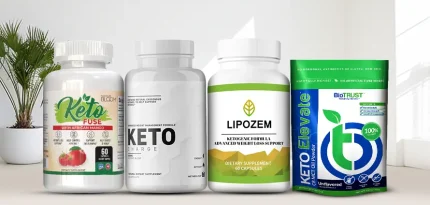
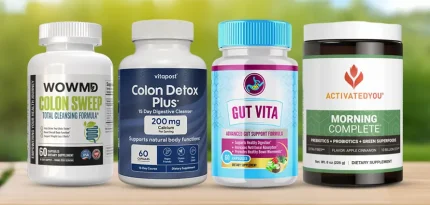



 This article changed my life!
This article changed my life! This article was informative.
This article was informative. I have a medical question.
I have a medical question. Ask a Question
Ask a Question
 This article contains incorrect information.
This article contains incorrect information. This article doesn’t have the information I’m looking for.
This article doesn’t have the information I’m looking for.